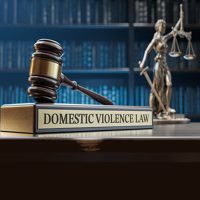What Happens At A Domestic Violence Injunction Hearing In Florida?

The State of Florida takes domestic violence very seriously and has several mechanisms in place to help abused spouses protect themselves. This includes domestic violence injunctions, which are a type of restraining order. In Orlando, we have two types of domestic violence injunctions: temporary orders and permanent orders. As a result, two types of hearings are possible: ex parte hearings and full hearings. The party who requests the injunction could have to attend both.
Who can request a domestic violence injunction?
Only certain people can request a domestic violence injunction, depending on your relationship with the person you are seeking protection against. To qualify for a domestic violence injunction, your relationship with the accused party must fall into one of the following:
- You are a spouse or former spouse of the accused
- You are a blood relative of the accused
- You are a relative by marriage (in-law)
- You share a child with the accused (regardless of whether you were ever married or lived together)
- You are a member of the same household as the accused (roommate)
To qualify for a domestic violence injunction, you must be in one of the aforementioned categories. In addition, you must have suffered violence, threats, stalking, or some other form of abuse that caused you to reasonably fear that harm was imminent.
Ex parte domestic violence injunction hearings
During an ex parte domestic violence hearing, you appear before a judge either alone or with your lawyer. The accused party is not present and is not invited to attend. Due to this fact, the order is only temporary. It lasts until the court can schedule a full hearing where both sides are present. Generally speaking, there is a matter of urgency with ex parte hearings. A full hearing could take two weeks. You may not have that kind of time.
During the hearing, you will have the opportunity to:
- Present testimony – The judge will ask you to testify concerning the domestic violence you experienced.
- Submit evidence – It is necessary to establish evidence of domestic violence. This could include police reports, medical records, photographs of the injuries, threatening messages, and witness statements.
You must prove your case by a preponderance of the evidence, which means it’s more likely than not. If the judge rules in your favor, they will issue a temporary domestic violence injunction and then schedule a full hearing to decide on a permanent injunction. Temporary injunctions generally last up to 15 days.
The full domestic violence injunction hearing
A full domestic violence injunction hearing should take place before the temporary domestic violence injunction expires. At this hearing, the accused will have the opportunity to attend and oppose the injunction by providing evidence and witnesses that corroborate their story. If the accused fails to attend, the court could issue the domestic violence injunction by default. This injunction could last for months, years, or indefinitely, depending on the judge. If the judge issues a permanent injunction, the accused will be photographed and fingerprinted in addition to paying court fees of between $50 and $500.
Talk to an Orlando Domestic Violence Attorney Today
Greater Orlando Family Law represents the interests of those who are seeking domestic violence injunctions or those defending against domestic violence injunctions. Call our Orlando family lawyers today to schedule an appointment, and we can begin scheduling your hearing right away.

